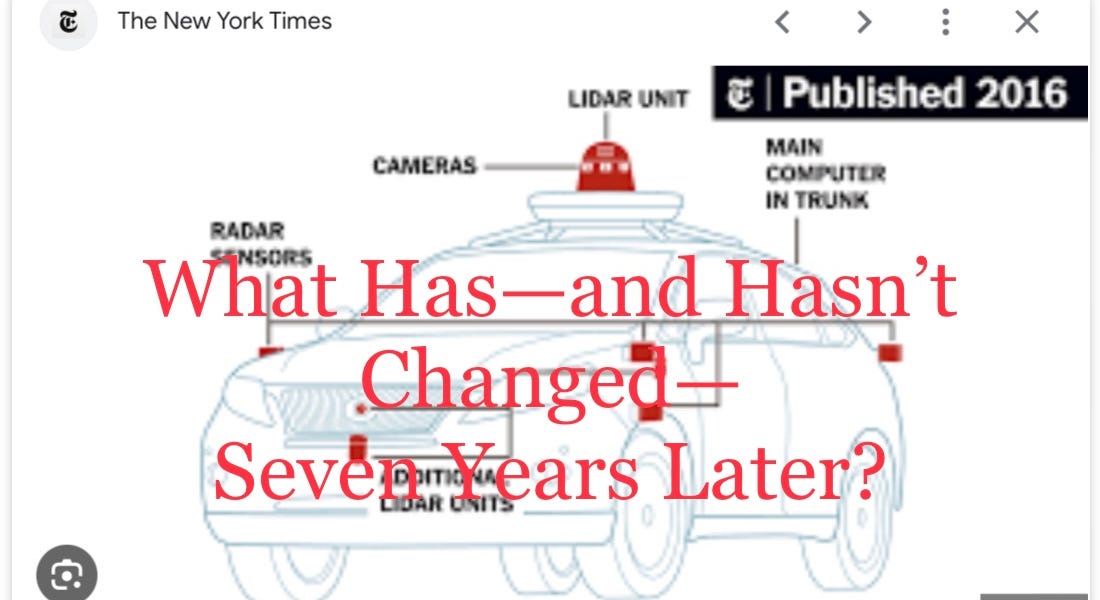Weeknotes 252 - the footprint of physical AI
Latest notions from the news beyond IoT, human-machine interactions, and experiencing misguiding AI

Hi y’all!
Happy birthday iMac; introduced 25 years ago, and saved Apple at that moment, it is the common opinion and the start of what is now the most valuable company. As always, the predictions on the current freshness start as we approach the yearly iPhone event in September, and rumours are heating up. Will it be a slow year? Is it finally the peak iPhone? Is there a shift towards services and accessories? Expect to have more on this in the coming weeks…
Triggered thoughts
Some personal experience. You all have been experimenting with the generative AI tools of course. Great for party tricks and for generating inspiring frameworks for your own writing sometimes. People often start using it as if it is a search engine. As soon as it is for current data, it still makes no sense with ChatGPT. And the added value of a simple query compared to a search is rather disappointing for people. But you would expect to have all the possibilities to get answers to complex search queries. I was trying to find the best place to see a movie combining multiple factors through Filmladder, and I thought that should be easier with a more intelligent search. The query: I want to go to a movie tomorrow evening but have not decided where to go; all are on the table: Rotterdam, Amsterdam, Delft of The Hague. So bottom line, we have options for cities to go to, and the movie and time are quite set.
So let’s try Bard. The first answer is clearly looking only at one movie theatre chain (Pathé) and missing the local ones. I then asked specially for that theatres, and it started mixing up the theatres and cities (Cinerama in Amsterdam etc). I have to correct Bard five times to get the right list. I hope it has learned for the next time. More problematic is that all viewing times are incorrect. It is using all the wrong sources for the task. And it is not honest in its insecurity, maybe I should prime it for that as John Maeda was pointing out.
So, in conclusion, leveraging AI for complex search queries is not there at all… Google expects a learning experience for the searcher embedding AI, but it is clearly both ways…
I did not try Claude yet btw, as it is not yet available here (US and UK only), but I will check asap if that makes a difference. It promises to be better in some aspects.
Events to notice
The holiday season is slowly ending, and meetups are beginning to start up again. Like:
- This evening, when in London: a new edition of the London IoT meetup.
- Tomorrow Amsterdam UX is visiting Miro.
- On heat stress and citizen science this Thursday at Waag in Amsterdam.
- 30 August: how do public platforms change the government and public services? A summerschool seminar in The Hague
Notions from the news
Before diving into the news, a moment to mark is the end of the Internet of Things podcast and newsletter: Stacey Higginbotham is stepping back. It was always a nice way to keep up to date with the latest in IoT devices and beyond, especially in the last years, with a lot of focus on the need for the responsible design of IoT. I had the very pleasant experience of meeting Stacey once when she attended a workshop on haptics I ran at SXSW. Too bad we never managed to have her at ThingsCon, but who knows… Thanks Stacey!
Let’s start with some IoT-related news. Or a bit broader, on sensing devices, Lidar on a chip feels like a potential opening up new forms of situational awareness of things. Things that have agency. Beyond cars.
I would make a connection to personal tech, something that has been a running discourse in connecting homes and stuff; agency of your personal space. Now we enter a new era, and so we see people looking into creating their own LLM.
This bridges to the hottest topic nowadays, generative AI. New discussions on AI copyrights for designers and architects. How about artists? And newspapers? The speed is incredible; AI has generated 150 years’ worth of photography in less than 12 months. It can create a new architectural style: neoclassical futurism.

Looking back on the future, how will AI governance look like, the AI Power Paradox linked to geopolitics?

Returning AI critics have interesting opinion pieces this week:
- Ethan Mollick: It isn't data that will unlock AI, it is human expertiseWe are used to technology being out of our hands, developed by teams of engineers and delivered to us, ready to accomplish the goal set out by the product’s designers. AI does not work that way. In this case, technology precedes use, allowing any of us to decide our own goals for what AI could do.
- Gary Marcus: The definition of AGI is bent by who has an interest in reaching it.
- Vitalik on Community Notes, the algorithmic fact-checking guardrails for social media, “a fascinating new and emerging genre of mechanism design: mechanisms that intentionally try to identify polarization, and favor things that bridge across divides rather than perpetuate them.”
- “AI is the culmination of thirty years of the commercial internet”. **The Internet is still early,** according to Evan Amstrong.
Some short updates on the AI playing field. OpenAI is buying a product design studio, Adobe Express is adding AI-features to take on Canva, employee AI within McKinsey, Whatsapp is testing AI-generated stickers.
AI is a physical product, after all…
Will our footprint extend beyond our death? And in that case, will we multiply the footprints if we get attached to our personal life coaches?


NFTs were already a bit out of fashion but apparently also broken now in their core.
/cdn.vox-cdn.com/uploads/chorus_asset/file/22413650/acastro_210329_1777_nft_0005.jpg)
Updates on robots, like delivery bots, the state in 2023, and looking into developments for 2024. Or toilet cleaning bots, construction robots. And what is defining robot safety? Sensitivity and Reliability. Flying bird robots uses almost no power.
Is the current AI capable of autonomous driving?


A longer user test with the Vision Pro

Speculative futures often mix with dystopian futures, especially if storytelling is important. This student projects touch on several and produces some nice imagery.

Paper for the week
Is this a kind of AI psychology? Adversarial Policies Beat Superhuman Go AIs
“We attack the state-of-the-art Go-playing AI system KataGo by training adversarial policies against it, achieving a >97% win rate against KataGo running at superhuman settings. Our adversaries do not win by playing Go well. Instead, they trick KataGo into making serious blunders.”
“Our results demonstrate that even superhuman AI systems may harbor surprising failure modes.”
Wang, T. T., Gleave, A., Tseng, T., Pelrine, K., Belrose, N., Miller, J., ... & Russell, S. (2023). Adversarial Policies Beat Superhuman Go AIs. https://doi.org/10.48550/arXiv.2211.00241
See y’all next week!
Last week I did prepare for the Inzamelbot presence at the preview of the new Grondstoffenstation Afrikaanderwijk. The Inzamelbot is a version of the Wijkbot / Hoodbot that we created in the field lab project. I also updated the website (or better, created a new one) with all the last year's activities; check it out here: wijkbot.nl
This week I focus on some proposal writing for potential future projects, among others on the Wijkbot. And will check out De Reuzen in Antwerp this coming weekend.
And I will dive into this definitive guide to using Midjourney before next week’s edition see how that works out.
Have a great week!






